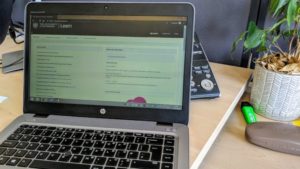Meeting the challenges of conducting user research remotely
 The coronavirus (Covid-19) outbreak has posed massive challenges for everyone in society. For practitioners of human-centred approaches to design, where face-to-face interaction is often so important to enhancing our understanding, our current requirement to maintain social distancing creates obvious barriers.
The coronavirus (Covid-19) outbreak has posed massive challenges for everyone in society. For practitioners of human-centred approaches to design, where face-to-face interaction is often so important to enhancing our understanding, our current requirement to maintain social distancing creates obvious barriers.
However, this doesn’t mean our work to ensure we’re meeting people’s needs has to stop. In fact, there are some perhaps surprising advantages to working remotely as a user experience practitioner.
I have been fielding queries from the University’s community of user experience enthusiasts. Conducting user experience work remotely is not entirely new to me (a Skype interview is always better than no interview). But the scale of remote research required right now is something that is new to all of us.
However, while there are clear challenges, it’s also true that this period is a huge opportunity to experiment and learn. This will help us become more flexible in the future.
So here I will summarise what I have learned over the past month or so about conducting remote user experience activities. I will cover collaboration specifically in another blog post shortly. But here I will focus on another activity with clear challenges: user research.
Keep conducting research with people
One consideration I saw some user experience practitioners discussing online is whether it’s appropriate to conduct user research at all amid the coronavirus outbreak. After all, everyone is dealing with such a new and unusual situation. If we were to undertake user research right now, would what we learn be meaningfully applicable to whatever the normal situation is in the future?
A consensus has quickly emerged: yes, we must continue user research. In many ways, we need to research people more than ever. But we do need to be even more careful about conducting research with people.
The Government Digital Service’s user research community has published some useful advice on carrying out research during the coronavirus outbreak in their service manual:
This does not mean user research has to stop. But it does mean we need to think carefully about what we do and how we do it.
As user researchers, we have a responsibility to those participating in research, and we need to take care of our own health and wellbeing.
Focus on what really matters to people
Focusing on what really matters is important at the best of times, but especially so right now. We should be aware that people might have more important things on their minds than whether interface A looks better than interface B.
So we should redouble our efforts to understand people’s contexts — what matters to them, and what that means for how they currently interact with your product or service. From there, you can begin to understand how your service needs to evolve to continue meeting users’ needs.
If you genuinely listen to people and focus on what matters to them, you might be surprised at how co-operative they can be, and how useful you find it to your research. One participant in a recent interview I conducted said to me at the end, “It’s good to be able just to talk.”
Remote research reduces some types of bias
It is striking that there are actually some advantages to conducting research remotely. For example, there are reduced risks around the Hawthorne effect (also known as the observer effect), whereby people modify their behaviour because they know they are being observed.
Lean into this situation. Take advantage of the fact that social distancing may be making your participants more honest, and therefore more useful to your research.
You may also be able to access a wider range of people, helping you conduct research with a more representative group of people. Certain types of people are more available to participate in more traditional face-to-face research.
But now we can reach (for example) people in other countries, and people who are less mobile, just as easily as people who happen to be loitering around the Main Library with 15 minutes to spare when we turn up in the middle of the day.
Appropriate methods
Interviews can just as easily be conducted remotely as in-person. You lose a bit of your participants’ context by not visiting them in their normal workplace. But the benefits of reduced observer effects may outweigh this.
Usability testing is similarly possible remotely, as long as your participant is able to work out how to share their screen. This might actually be advantageous, because users can work with their own devices rather than your own laptop with the recording software on it.
Diary studies are an under-rated research method. You can get really rich information on a more longitudinal basis that simply isn’t possible in a face-to-face interview. Now might be the time to deploy such methods.
We have recently completed some user research conducted with a chatbot, in collaboration with academics from Design Informatics. I will write about that project in more detail for a future blog post.


1 replies to “Meeting the challenges of conducting user research remotely”